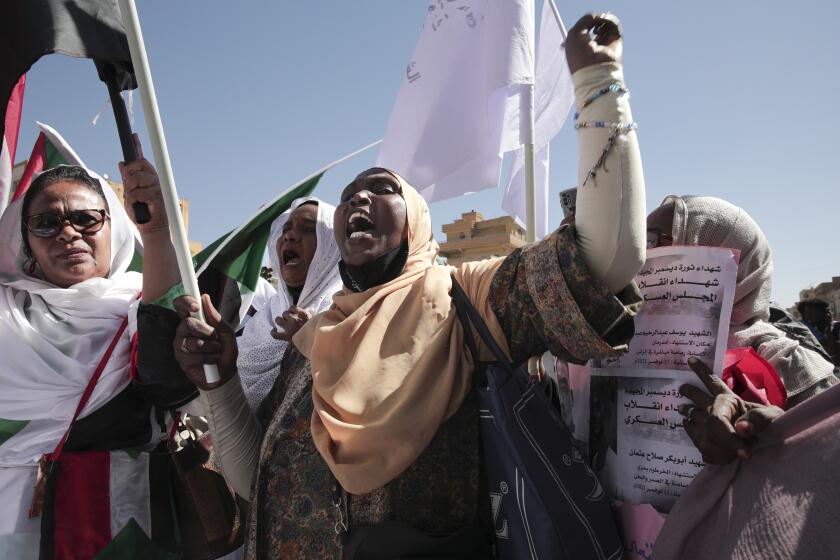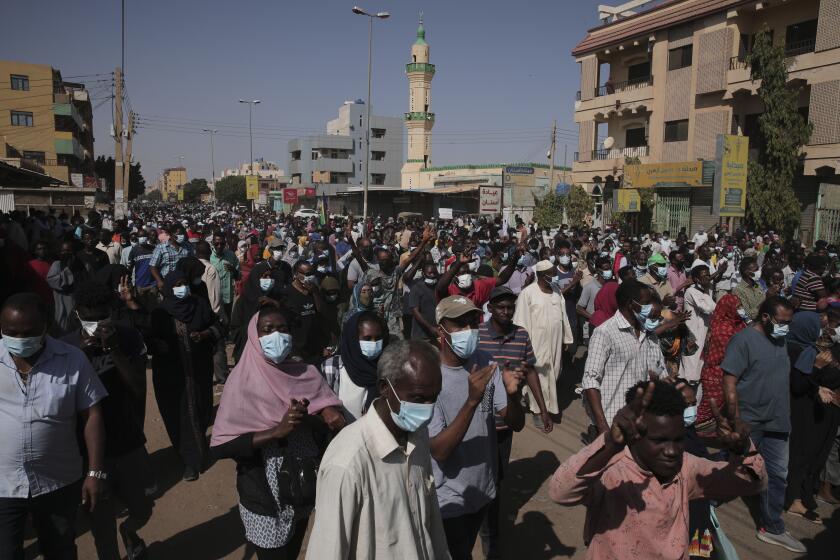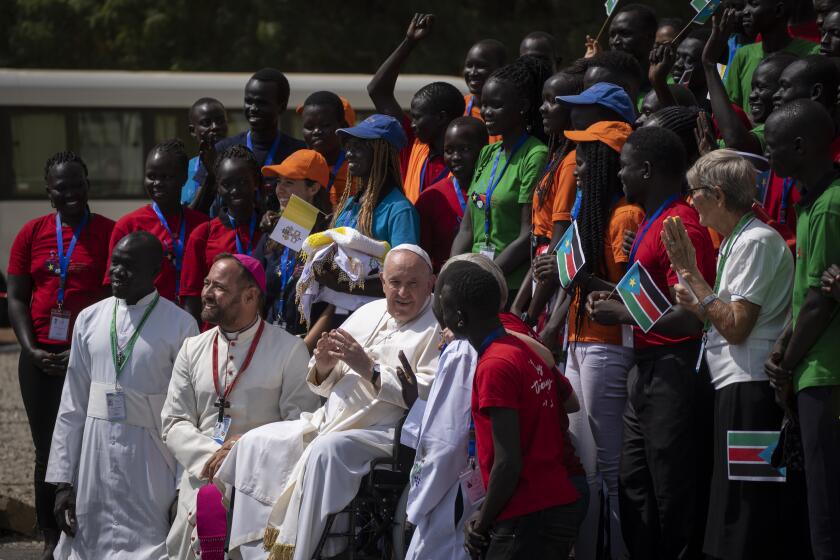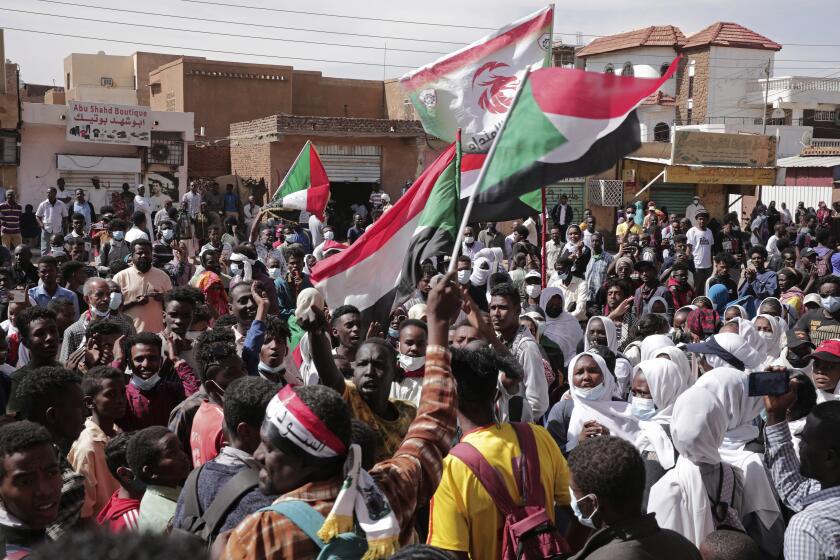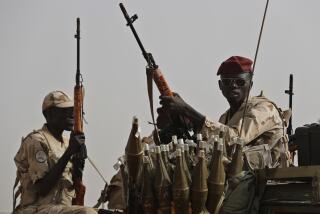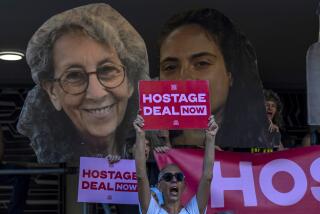Truce falls apart in Sudan as rival forces continue battling for control
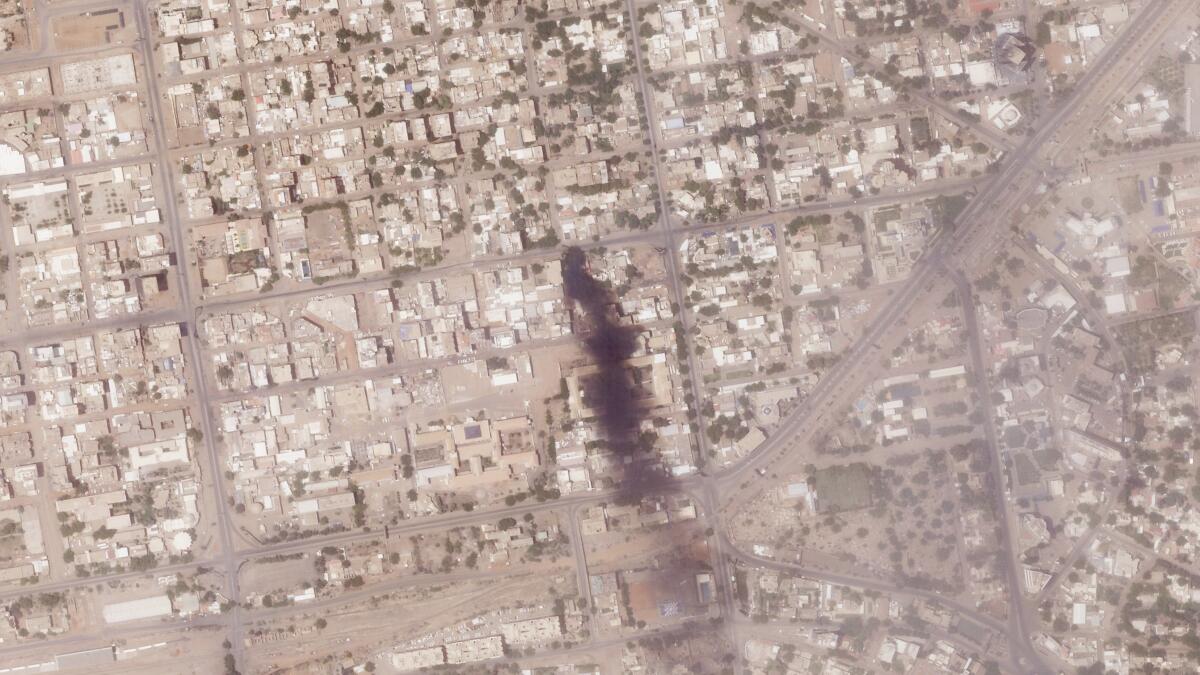
KHARTOUM, Sudan — Terrified Sudanese who have been trapped for days in their homes by fighting in Khartoum fled Wednesday, hauling out whatever belongings they could carry and trying to escape the capital after an internationally brokered truce failed and rival forces battled in the streets for a fifth day.
The swift collapse of the 24-hour cease-fire, despite pressure from the U.S. and regional powers, suggested that Sudan’s two top generals were determined to crush each other in a potentially prolonged fight for control of the country. It also underscored the inability of the international community to force a stop to the violence, with millions of people caught in the crossfire.
As explosions and heavy gunfire shook Khartoum, residents of multiple neighborhoods told the Associated Press that they could see hundreds of people, including women and children, leaving their homes, carrying luggage, some leaving on foot, others crowding into vehicles. Residents had been desperately holding out with dwindling food and other supplies, hoping for a halt in the mayhem on their doorsteps — gunfire, shelling and airstrikes, along with armed fighters roaming the streets looting shops and attacking passersby.
“Khartoum has become a ghost city,” said Atiya Abdalla Atiya, secretary of the Sudanese Doctors’ Syndicate, who is still in the capital.
The generals’ forces have battled it out since Saturday in residential neighborhoods of Khartoum, the neighboring city of Omdurman and other major towns of the country. Nearly 300 people have been killed the last five days, the United Nations’ health agency said, but the toll is likely higher, since many bodies have been left in the streets, unreachable because of clashes.
A 24-hour cease-fire was to have been in effect from sundown Tuesday to sundown Wednesday. It was the most concrete attempt yet to bring a pause in fighting that it was hoped could be expanded into a longer truce.
Sudan’s military coup leaders and the country’s main pro-democracy group have signed a deal to establish a civilian-led transitional government.
It came after U.S. Secretary of State Antony J. Blinken spoke separately by phone with the two rivals — the leader of the armed forces, Gen. Abdel Fattah Burhan, and the head of the paramilitary Rapid Support Forces, Gen. Mohammed Hamdan Dagalo. Egypt, which backs the Sudanese military, and Saudi Arabia and the United Arab Emirates, which have close ties to the RSF, have also been calling on all sides to stand down.
But fighting continued after the intended start of the truce and through the night. Each side blamed the other for the failure.
Fierce clashes between the army and RSF were reported Wednesday morning around the military’s headquarters in central Khartoum and the nearby airport, as well as around the state television building across the river in Omdurman. Bombs and artillery could be heard around the city.
A high-rise in the city center was on fire, with burning debris falling from its top floors, according to footage by the Al Arabiya news network.
Sudanese security forces have fired live ammunition and tear gas to disperse protesters denouncing the military’s tightening grip on the country.
“The battles intensified in the morning after sporadic gunfire over the night,” said Tahani Abass, a prominent rights advocate who lives close to the military headquarters. “Bombing and explosions are shaking our houses.”
Mahasen Ali, a tea vendor, said many in her south Khartoum neighborhood have left their homes to take refuge in open areas, hoping to be safe from shelling that hit buildings. Others fled the city to stay with relatives elsewhere, she said.
Armed men were roaming the streets, storming shops and houses. “They take whatever they can, and if you resist, they kill you,” she said.
Foreigners, including aid workers and diplomats, have also been trapped in the fighting. German media, including the DPA news agency, reported that three A400M transport planes were dispatched to evacuate German citizens from Khartoum, but turned around Wednesday after refueling in Greece because of security concerns in Sudan.
Pope Francis says South Sudan’s future depends on how it treats its women. It has not been treating them well.
In Brussels, Dana Spinant, a spokeswoman for the European Commission, confirmed reports that a senior European Union official had been shot and wounded in Sudan. Spinant did not provide details.
The New York Times identified the official as Wim Fransen, a Belgian national. The report said Fransen was receiving medical treatment for serious injuries. It said that he had gone missing Sunday evening and that his colleagues tracked him down Tuesday.
Another spokeswoman confirmed that the EU office in Khartoum is still operating. The EU ambassador, who was assaulted when unidentified gunmen broke into his residence several days ago, is back at work, she said, adding that the EU delegation is not being evacuated and everyone is safe.
The battles, with heavy machine guns, artillery and airstrikes, have wreaked extensive damage, playing out in the streets of Khartoum and Omdurman on the opposite bank of the Nile River, as well as in other key towns around Sudan.
Start your day right
Sign up for Essential California for the L.A. Times biggest news, features and recommendations in your inbox six days a week.
You may occasionally receive promotional content from the Los Angeles Times.
Dozens of healthcare facilities in Khartoum and around the country have stopped functioning because they are close to clashes, the Doctors’ Syndicate said Wednesday. At least nine hospitals were bombed and 16 were evacuated, it said.
The U.N.‘s World Health Organization said Wednesday that at least 296 people have been killed and more than 3,000 wounded since fighting began, without offering a breakdown of civilians and combatants. The Sudan Doctors’ Syndicate, which monitors casualties, said Tuesday that at least 174 civilians have been killed and hundreds wounded.
Blinken had described the proposed one-day humanitarian cease-fire as a building block for a longer truce and a return to eventual negotiations. The failure to pause fighting for even a day, despite high-level diplomatic pressure, suggests that the generals remain bent on pursuing a military victory.
The conflict between the military and the RSF has once again derailed Sudan’s transition to democratic rule after decades of dictatorship and civil war.
Sudan’s Prime Minister Abdalla Hamdok has announced his resignation amid political deadlock and widespread pro-democracy protests after a military coup.
A popular uprising four years ago helped depose longtime autocrat Omar Bashir, but Burhan and Dagalo allied to carry out a 2021 coup. Both generals have a long history of human rights abuses, and their forces have cracked down on pro-democracy activists.
Under international pressure, Burhan and Dagalo recently agreed to a framework agreement with political parties and pro-democracy groups. But the signing was repeatedly delayed as tensions rose over the integration of the RSF into the armed forces and the future chain of command — tensions that exploded into violence Saturday.
More to Read
Sign up for Essential California
The most important California stories and recommendations in your inbox every morning.
You may occasionally receive promotional content from the Los Angeles Times.
